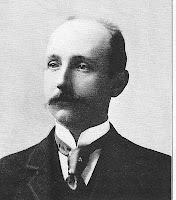 |
| 1759 & 1757 Q Street NW |
 |
| William Bradbury |
The well respected “Bradbury piano” is familiar to
generations of pianists and musicians beginning with its unveiling in 1861 in
New York. The influence of the company
and its profitability spread rapidly, and a showroom for the many varieties and
models of Bradbury’s opened in Washington in 1877. Located at 1225 Pennsylvania Avenue and owned
by Freeborn G. Smith, the building featured a plethora of advertising signs,
and was managed for decades by a Dupont Circle resident in the 1700 block of Q
Street by the (great) name of William Van Wickle.
 |
| 1225 Pennsylvania Ave |
The Bradbury piano was the brainchild of noted hymn singer
and church music composer William Batchelder Bradbury, who strived to combine
the traditional tone of the organ with the mechanics of a standard piano. His vision became a reality with the
production of the “Bradbury” piano in 1854.
And, like any good businessman of today, Bradbury cashed in and sold the
business shortly thereafter, in 1867, to investor Freeborn Garrettson Smith,
but died just a year later. Smith’s
Washington’s showroom opened just ten years later, in 1877. By 1903, Bradbury
pianos were being mass produced with impressive quality, and sold in showrooms
that Smith owned in eighteen cities nationwide.
 |
| William Van Wickle |
The long time manager of Washington’s F.G. Smith Piano
Company was Dupont Circle resident William Perrine Van Wickle, who resided at
1757 Q Street, NW. Pictured above, it was later replaced by a modern townhouse, but had looked like its neighbor at 1759 Q Street, a brown stone house also seen above).
Van Wickle was born
in November of 1856 in Lyons, New York, and received his education at Palmyra
(NY) Classical School, and at the Troy New York Academy. He went to New York City in 1876 and worked
for the Bradbury Piano Factory as a shipping clerk and later in the repairs
department and general offices. In 1878, he opened a branch piano warehouse in
Brooklyn and another in Jersey City, in August 1879.
He moved to Washington in 1879 to take charge of Bradbury
Warerooms, which Freeborn G. Smith had purchased that year from Harry Sanders and
Dr. J. A. Stayman, intending to stay for only a short time. It was then located at 1103 Pennsylvania
Avenue, but in 1887 moved into larger quarters that Smith had constructed in
1887 at 1225 Pennsylvania Avenue, seen here.
The site had earlier been home to Barlow’s art gallery.
The 1903 Book of
Washington states that “the successful sale of the well respected Bradbury
pianos in Washington was largely due to William's personal acquaintance with
public men and high officials from the chief executive on down.” The five story showroom allowed space for 75
Bradbury piano models to be seen, and older pianos to be stored that had been
taken in exchange for new Bradbury’s.
Van Wickle eventually established the Van Wickle Piano
Company, also handling the Bradbury line of pianos. In 1888, he married Albenia Gibson King, who
was well connected to an old and established Washington family. She had been born in Washington in September,
1867.
William was director and treasurer of the Washington Board
of Trade, a member of the Columbia Historical Society and the National
Geographic Society. He was a leader in the Free and Accepted Masons, member of
Lafayette Lodge #19, Royal Arch Masons, Washington Commandery, and the Knights
Templar. He was secretary of the
reception committee that welcomed Admiral Dewey to Washington and was appointed
secretary of National Capital Centennial Commission, which commemorated the one
hundredth anniversary of the establishment of the seat of Government in the
District of Columbia on December 12, 1900.
Van Wickle was also chairman of a committee charged with over
200 points of historical interest in Washington during the 36th
National Encampment of the Grand Army of the Republic in 1902, nearly 100 years
before the city witnessed the creation of a heritage trail. Van Wickle died on October 25, 1926.
Bradbury pianos continue to be manufactured today, under
several subsequent changes in business names.
Today's Bradbury models follow the trend towards less expensive,
smaller, more compact, instruments and are made in a variety of designs.


2 comments:
I enjoyed your biography. I did the same thing a while back. if you would like to take a look I had found some nice photos of Bradury.
Bradbury Piano Co.
I also enjoyed your biography especially since my great great grandfather was William Bradbury. My grandfather, Harry Brower, could play every instrument there is, including, of course, the piano.
Post a Comment